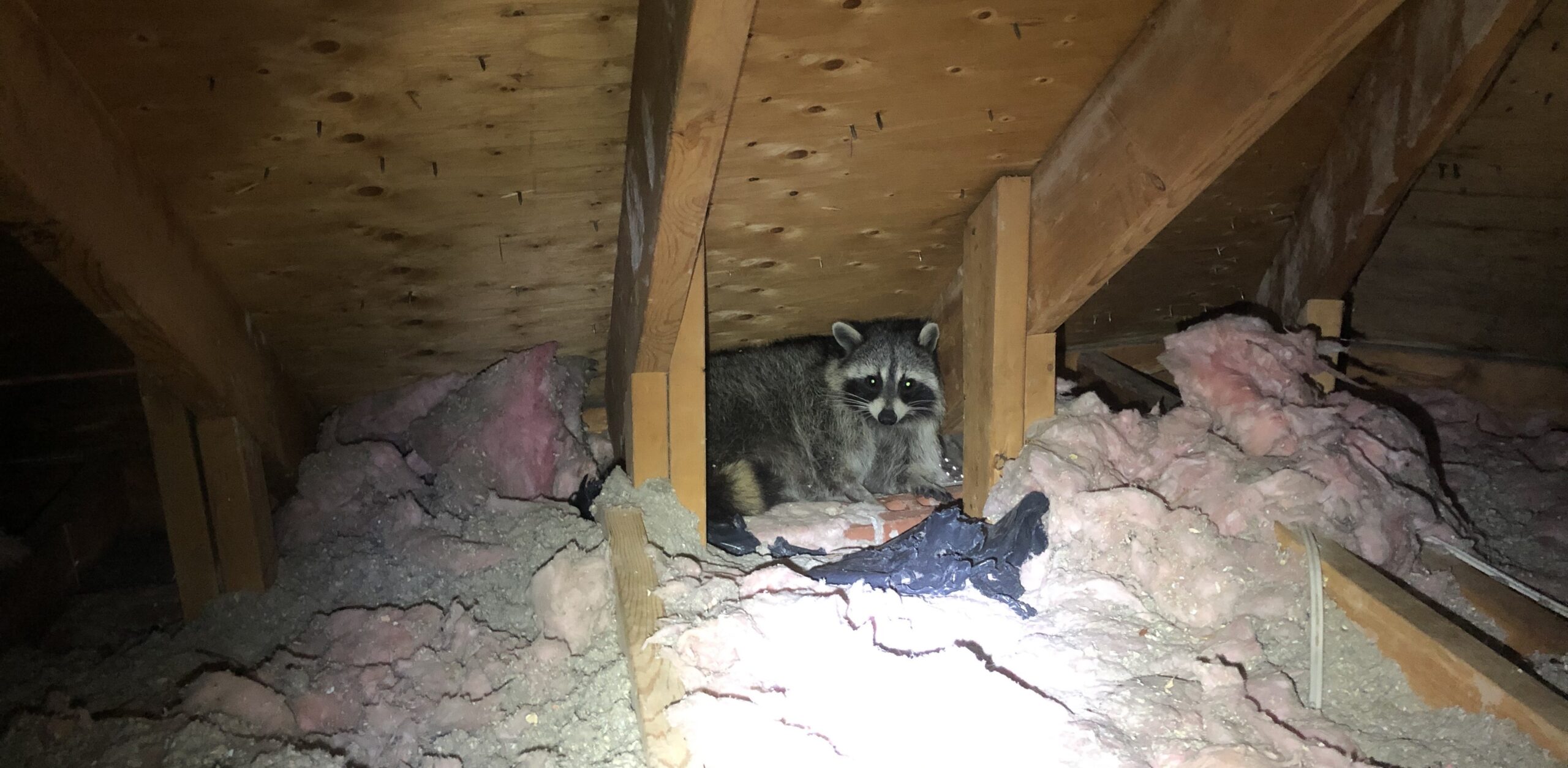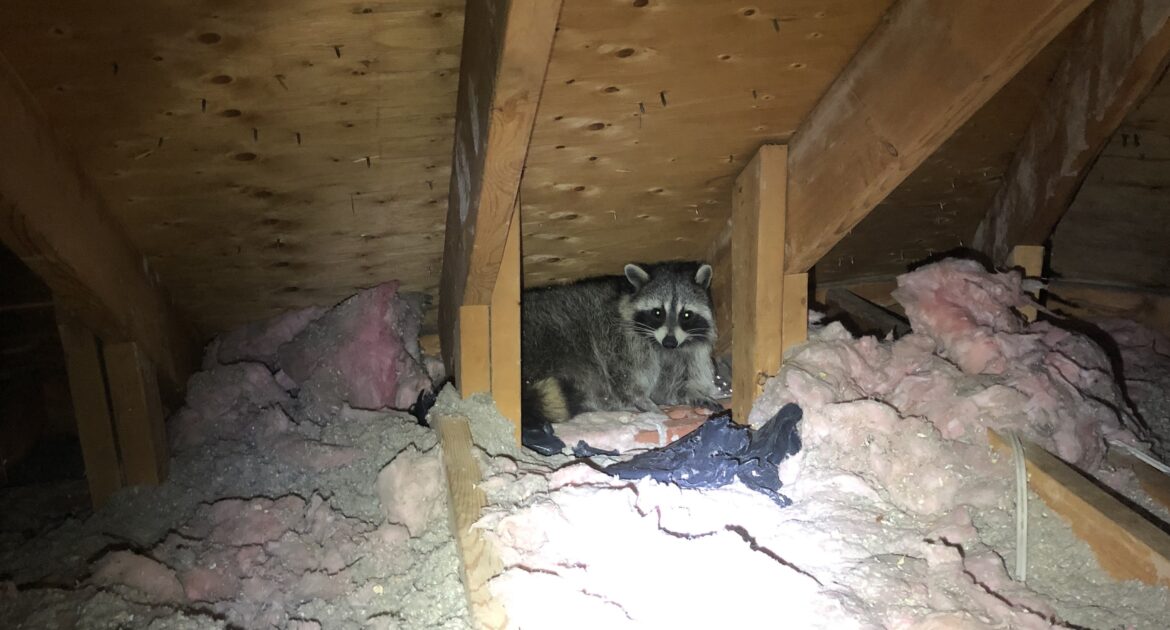Raccoons are resourceful animals. They’re clever, adaptive, and capable of thriving in both the wilderness and urban areas. While it’s fascinating to see these creatures in your neighbourhood, their curiosity can lead them into your attic, garage, or even your trash bins. Now, you might be wondering, how can you keep your home safe while also ensuring raccoons stay happy and unharmed?
The answer lies in coexisting with raccoons. This means taking the proper steps to raccoon-proof your home while prioritizing the well-being of these animals. At Skedaddle Humane Wildlife Control in Toronto, we know that living alongside wildlife can be a positive experience—as long as precautions are in place.
Below, we’ll walk you through some effective raccoon safety tips and actionable steps to protect your home while respecting these neighbourhood neighbours.
Why Coexisting with Raccoons Matters
Raccoons are a vital part of the urban ecosystem. They help control pests like insects and rodents, often contributing to the balance of local biodiversity. The key to living peacefully with raccoons is developing smart boundaries. By raccoon-proofing your home, you can prevent unwanted encounters while allowing these animals to live harmoniously alongside us.
If you’ve noticed signs of raccoons near or inside your property, it’s important to act now. Without taking the right steps, you could unintentionally invite a raccoon family to settle in. But don’t worry—we’re here to help you create a safe and wildlife-resistant home.
Raccoon-Proof Your Home
The first step to keeping your home free from raccoons is securing any potential entry points they might find. Raccoons are strong and determined, but there are practical ways to make your home less inviting to them.
- Inspect and Seal Openings: Look for gaps around your roof, soffits, chimney, and vents. Raccoons can squeeze into surprisingly small spaces, so ensure every crack is properly sealed. You should check these spots every few months because weather can create new holes that raccoons will find and use.
- Secure Garbage Bins: Raccoons are notorious for rummaging through trash. Use heavy-duty bins with locking lids to make your garbage inaccessible. These smart animals can figure out how to open regular garbage cans, so you need bins that are harder for them to get into.
- Install Protective Grates: Cover vents, chimneys, and drainage pipes with sturdy metal grates to prevent raccoons from exploring these areas. Make sure the grates have small holes so raccoons can’t squeeze through or get their paws stuck trying to remove them.
- Trim Tree Branches: These animals are excellent climbers. Trim branches that are close to your roof to remove easy access points. You should keep branches at least six feet away from your house because they can jump pretty far from tree to roof.
Taking these steps not only protects your home but also encourages them to find natural shelter instead of seeking warmth in your attic.
Reduce Attractions
What draws raccoons to your property in the first place? It’s often food and shelter. Minimizing these attractions will discourage raccoons from hanging around.
- Don’t Leave Pet Food Outside: Pet food is easy pickings for raccoons, so always bring bowls inside after feeding your pets. Even small amounts of leftover kibble can attract raccoons to your yard night after night.
- Clean Your BBQ Grill: Leftover food particles on your grill can act like a beacon for raccoons. Clean it thoroughly after use. You should scrub off all the grease and food bits because they have a very good sense of smell.
- Pick Up Fallen Fruit: If you have fruit trees, make sure to clear any fallen fruit immediately—this is a favourite snack for raccoons. Check under your trees every day during fruit season because even one rotten apple can bring them to your yard.
- Keep Compost Bins Covered: Use raccoon-proof compost bins to keep odours contained and critters out. You should also avoid putting meat scraps or dairy products in your compost because these smells are extra attractive to raccoons.
By eliminating food sources, you’re giving these animals one less reason to set up camp near your home.
Understand Raccoon Behaviour
Raccoons are nocturnal animals, most active during the night. They’re naturally curious, especially when they’re looking to eat or nest. Knowing how and when they operate can help you stay a few steps ahead.
Here are a few key facts about raccoons:
- Raccoons have heightened dexterity, allowing them to open latches, flip lids, and manipulate items.
- They can remember the location of food for weeks at a time, so once they find a source, they’ll likely return.
- Female raccoons look for safe, quiet spaces to raise their young, which can often mean attics or crawlspaces.
Being aware of their habits boosts your ability to raccoon-proof effectively.
When to Call Professionals
Sometimes, despite your best efforts, a determined raccoon might still find its way into your home. DIY methods rarely work in these situations and can even escalate the problem. That’s where we come in.
At Skedaddle Humane Wildlife Control in Toronto, we specialize in safe, humane solutions for removing raccoons from your property. Unlike traditional methods, we use one-way doors that allow them to leave your home but prevent them from coming back in. These doors are highly effective because they never separate mothers from their babies and ensure the animals are rehomed naturally in the wild.
Our approach ensures your home stays raccoon-free, and the animals remain unharmed. If you’re dealing with a raccoon problem, it’s always best to leave it to the experts.
Raccoon Safety Tips for Outdoor Spaces
Even if raccoons don’t move into your home, there’s a chance you’ll encounter them in your yard. Here’s how to keep yourself, your family, and the raccoons safe.
- Observe from Afar: If you see a raccoon in your yard, enjoy the sight from a safe distance. Don’t approach or attempt to feed wildlife.
- Keep Pets Indoors: Ensure your pets stay inside or are supervised when in the yard, especially at night.
- Avoid Startling Raccoons: If you surprise a raccoon, it may feel threatened. Make noise as you enter spaces like garages or sheds at night to give them a chance to leave.
- Cover Garden Plants: If raccoons are feasting on your vegetables, use garden netting to protect your crops.
By following these tips, you can reduce unwanted interactions while respecting raccoons’ space in your outdoor environment.
A Safe Home and Happy Wildlife
Living in Toronto means sharing space with all sorts of wildlife, and raccoons are some of the most common visitors. By learning how to raccoon-proof your home and practising coexisting with raccoons, you can keep your property safe while ensuring these animals can thrive in their natural environment.
If raccoons have already made their way into your home, don’t wait—get in touch with Skedaddle Humane Wildlife Control in Toronto for expert help. Our humane techniques, including one-way doors, provide the peace of mind you deserve while protecting wildlife. Request an estimate from our team today and take the first step to a raccoon-free home!




